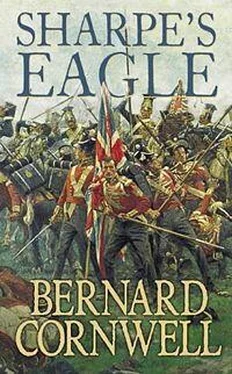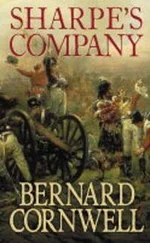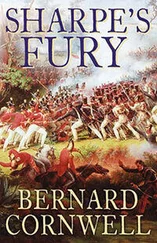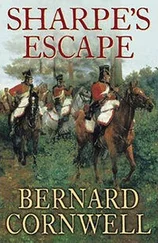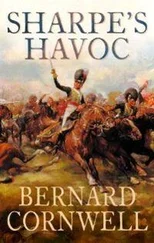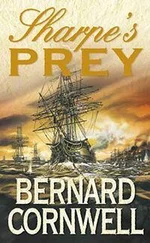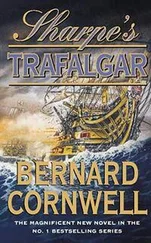Vultures circled the northern hills. The sun dropped red and slanted shadows on the burning field, on the men who struggled to escape the flames, and on the blackened troops who stirred themselves to loot the dead and move the wounded. Sharpe and Harper wandered their own course, two men in the curtains of smoke and burning grass, both bleeding but with their faces creased in private mirth. Sharpe held the Eagle. It was not much to look at: a light blue pole eight feet long and on its top the gilded bird with wings outspread and in its left raised claw a thunderbolt it was about to launch at the enemies of France. There was no flag attached; like so many other French Battalions the previous owners had left their colour at the depot and just carried Napoleon’s gift to the war. It was less then two hands’ breadth across, and the same in height, but it was an Eagle and it was theirs.
The Light Company had watched them go. Only Sharpe, Harper and Denny had gone through the ranks of the enemy Battalion, and when the French attack crumbled the rest of the Light Company had been pushed to one side by the panicked rush of the survivors fleeing from the clockwork volleys. Lieutenant Knowles, a bullet in his shoulder, watched as the men went on firing at the retreating French and then led them back to meet the Battalion. He knew Sharpe and Harper were somewhere in the smoke and they would turn up, with or without the Eagle.
Lieutenant Colonel the Honourable William Lawford sat his horse and stared at the bodies on the field. He had led the South Essex down the slope and watched as they fired their muskets, slowly but calmly, into the white-jacketed enemy. He had seen the fight for the Eagle, but the spreading smoke of the Battalion’s volleys had blotted out the scene and the survivors of the Light Company told him little more. A Lieutenant brought in forty-three bleeding and stained men, grinning like monkeys, who talked of the Eagle but where was it? He wanted to see Sharpe, wanted to see his friend’s face when he discovered that his companion of the Seringapatam jail was now his Colonel, but the field was shrouded in flames and smoke, so he gave up looking and started the Battalion on the grisly task of stripping the dead and piling the naked bodies like cordwood for the fire. There were too many to bury.
Sir Henry Simmerson was done. Wellesley had sworn, briefly and fluently, and sent Lawford to take over the Battalion. Lawford hoped to keep it, it was time he commanded a Battalion, and there was much to be done with it. Major Forrest rode up to him and saluted.
“Major?”
“Except for the Light Company, sir, we’ve lost very few.”
“How many?” Lawford watched as Forrest fetched a piece of paper from his pouch.
“A dozen dead, sir, perhaps twice as many wounded.”
Lawford nodded. “We got off lightly, Major. And the Light Company?”
“Lieutenant Knowles brought in forty-three, sir, and most of them are wounded. Sergeant Read stayed with the baggage with two others, that’s forty-six. There were five men too sick to fight who are in the town.” Forrest paused. “That’s fifty-one, sir, out of a complement of eighty-nine.”
Lawford said nothing. He leaned forward on his saddle and peered into the shifting smoke. Forrest cleared his throat nervously. “You don’t think, sir… „He tailed the question away.
“No, Major, I don’t.” Lawford sat upright and turned his charm onto the Major. “I’ve known Richard Sharpe since I was a Lieutenant and he was a Sergeant. He should have died a dozen times, Major, at least a dozen, but he crawls through somehow.” Lawford grinned. “Don’t worry about Sharpe, Major. It’s much better to let him worry about you. Who else is missing?”
“There’s Sergeant Harper, sir… „
“Ah!” Lawford interrupted. “The legendary Irishman.”
“And Lieutenant Gibbons, sir.”
“Lieutenant Gibbons?” Lawford remembered the meeting in Wellesley’s headquarters at Plasencia and the petulant expression on the blond Lieutenant’s face. “I wonder how he’ll get on without his uncle?” The Lieutenant Colonel smiled briefly; Gibbons was his least concern. There was still so much to do, so many men to be rescued before the townspeople spread into the carnage to loot the bodies. “Thank you, Major. We’ll just have to wait for Captain Sharpe. In the meantime would you arrange a party to get water for the men? And let’s hope these French dead have got food in their packs, otherwise we’re in for a lean night.”
The French did carry food, and gold, and Sharpe, as he always did, split his finds with Harper. The Sergeant was carrying the Eagle, and he peered at the bird thoughtfully.
“Is it worth money, sir?”
“I don’t know.” Out of habit Sharpe was reloading his rifle, and he grunted as he forced the ramrod into the fouled barrel.
“But they’ll reward us, sir, surely?”
Sharpe grinned at the Sergeant. “I’d think so. The Patriotic fund ought to be good for a hundred guineas, who knows?” He slid the ramrod back into place. “Perhaps they’ll just say ”thank you“.” He bowed ironically to the Irishman. “Thank you, Sergeant Harper.”
Harper bowed clumsily back. “It was a pleasure, Captain Sharpe.” He paused. “The bastards had better pay something. I can’t wait to see Simmerson’s face when you give him this.”
Sharpe laughed, he was looking forward to that moment. He took the Eagle from Harper. “Come on. We’d better find them.”
Harper touched Sharpe’s shoulder and froze, staring into the smoke above the stream. Sharpe could see nothing. “What is it?”
“Don’t you see it, sir?” Harper’s voice was hushed, excited. “There! Damn! It’s gone.”
“What, for God’s sake, what?”
Harper turned to him. “Would you wait, sir? Two minutes?”
Sharpe grinned. “A bird?”
“Aye. The magpie with the blue tail. It went over the stream and it can’t be far.” Harper’s face was lit up, the battle suddenly forgotten, the capture of the Eagle a small thing against the spotting of the rare bird he had yearned so long to see.
Sharpe laughed. “Go on. I’ll wait here.”
The Sergeant went silently towards the stream, leaving Sharpe in the drifting smoke among the bodies. Once a horse trotted past, intent on its own business, its flank a sheet of blood, and far off, behind the flames, Sharpe could hear bugles calling the living into ranks. He stared at the Eagle, at the thunderbolt gripped in the claw, the wreath round the bird’s neck, and felt a fresh surge of elation at its capture. They could not send him to the West Indies now! Simmerson could do his worst, but the man who brought back the first captured French Eagle was safe from Sir Henry. He smiled, held the bird up so its wings caught the light, and heard the hoof beats behind him.
His rifle was on the ground and he had to leave it as he rolled desperately to avoid Gibbons’ charge. The Lieutenant, curved sabre drawn, was wild-eyed and leaning from the saddle; the blade hissed over Sharpe’s head, he fell, kept rolling, and knelt up to see Gibbons reining in the horse, turning it with one hand, and urging it forward. The Lieutenant was giving Sharpe no time, even to draw his sword; instead he pointed the sabre like a lance and spurred forward so that the blade would spear into Sharpe’s stomach. Sharpe dropped and the horse went thundering beside him, turned on its back legs, and Gibbons was high over him with the sabre stabbing downwards. Neither man spoke. The horse whinnied, reared and lashed with its feet, and Sharpe twisted away as the sabre jabbed down.
Sharpe swung with the Eagle, aiming for the horse’s head, but Gibbons was too good a horseman and he smiled as he easily avoided the wild blow. The Lieutenant hefted the sabre in his hand. “Give me the Eagle, Sharpe.”
Читать дальше
